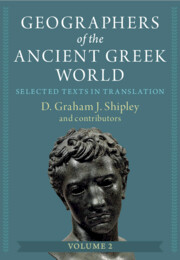Book contents
- Frontmatter
- Dedication
- Epigraph
- Contents
- PART IV: Roman Period
- 22 Juba II of Mauretania
- 23 Isidoros of Charax
- 24 Pseudo-Aristotle, On the Cosmos (De mundo)
- 25 Pseudo-Arrian, Circumnavigation of the Erythraian Sea
- 26 Pseudo-Plutarch, On the Names of Rivers and Mountains and the Things in them
- 27 Arrian of Nikomedeia, Circumnavigation of the Euxine
- 28 Dionysios Periegetes
- 29 Agathemeros son of Orthon
- 30 Dionysios of Byzantion
- 31 Pseudo-Hippolytos, Stadiasmos (Stade Table or Circumnavigation of the Great Sea)
- PART V: Late Antique Period
- Sources of Extracts (Selected)
- Works Cited
- Concordances
- Selective Index
22 - Juba II of Mauretania
from PART IV: - Roman Period
Published online by Cambridge University Press: 25 March 2024
- Frontmatter
- Dedication
- Epigraph
- Contents
- PART IV: Roman Period
- 22 Juba II of Mauretania
- 23 Isidoros of Charax
- 24 Pseudo-Aristotle, On the Cosmos (De mundo)
- 25 Pseudo-Arrian, Circumnavigation of the Erythraian Sea
- 26 Pseudo-Plutarch, On the Names of Rivers and Mountains and the Things in them
- 27 Arrian of Nikomedeia, Circumnavigation of the Euxine
- 28 Dionysios Periegetes
- 29 Agathemeros son of Orthon
- 30 Dionysios of Byzantion
- 31 Pseudo-Hippolytos, Stadiasmos (Stade Table or Circumnavigation of the Great Sea)
- PART V: Late Antique Period
- Sources of Extracts (Selected)
- Works Cited
- Concordances
- Selective Index
Summary
This chapter presents new, annotated translations of the testimonia and fragments (mostly from Pliny the Elder) of various works by Augustus’ client king Juba II of Mauretania (active c.27 BC–AD 23/4), selected with a focus on geographical material. This is the first such collection of his geographical writings. The chapter introduction emphasizes his links with the former Ptolemaic dynasty through his queen, Kleopatra Selene (daughter of Mark Antony and Kleopatra VII), links which the royal couple kept up through iconography and patronage within their kingdom. Juba’s outstanding literary output can be seen as another reflection of this connexion, aimed at integrating Mauretania into the Greco-Roman cultural sphere and conferring distinction upon the kingdom. His geographical writing embodied travels and researches extending as far as Egypt and western Asia, and was based on a close appreciation of earlier writers including Agatharchides (Chapter 15 of this volume). His wide-ranging cultural and scientific interests are well represented in the extracts, particular highlights being the course of the Nile (believed to have its source within Mauretania), the fauna of the Canary Islands, and the discovery and naming of the plant family Euphorbiaceae, the spurges. A new map illustrates the range of Juba’s geographical interests, spanning the whole longitudinal range of the Roman empire south of the Mediterranean.
Keywords
- Type
- Chapter
- Information
- Geographers of the Ancient Greek WorldSelected Texts in Translation, pp. 631 - 652Publisher: Cambridge University PressPrint publication year: 2024



